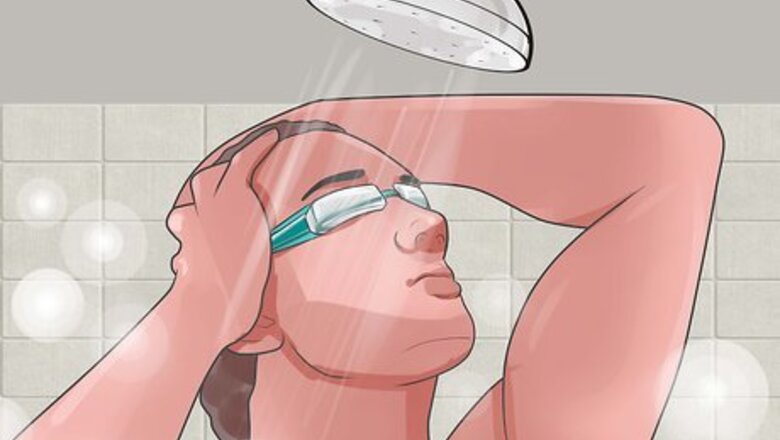
views
X
Trustworthy Source
Harvard Medical School
Harvard Medical School's Educational Site for the Public
Go to source
Recovery time can depend on the type of surgery you receive and how well you take care of your eye afterwards. Experts note that no matter what type of procedure you have, you need to give your eye time to rest and heal properly for a full recovery.[2]
X
Trustworthy Source
US Food and Drug Administration
U.S. government agency responsible for promoting public health
Go to source
Protecting Your Eye
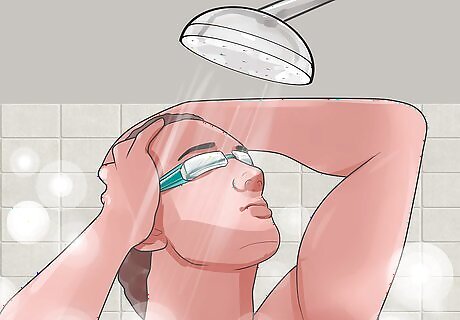
Avoid getting water in the affected eye. While splashing water on your face may feel great, it can spread infection and cause greater eye discomfort after surgery. Depending on the surgery, the length of time to avoid getting water in the eye can vary. For example, after LASIK surgery, you should use goggles while showering for about a week. Speak to your doctor for specific guidance. This does not necessarily apply to all surgeries, so check with your doctor. After retinal surgery, for instance, it is probably okay to get a little water in your eye one day after surgery. Be very gentle whenever you dry your face.
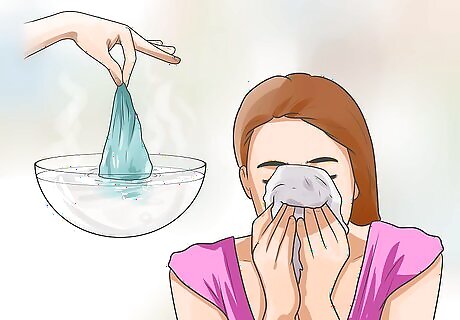
Adjust your washing routine. Instead of splashing water to wash your face, wet a washcloth and rinse your face with light pressure. Showers can be tricky right after surgery, as you need to avoid letting water drip down into your eye (except in the case of retinal surgery). Until your doctor gives your the green light, it may be easier to take baths in water that reaches up to the neck. To wash your hair, tilt your head back so your hair gets wet while your face remains dry.
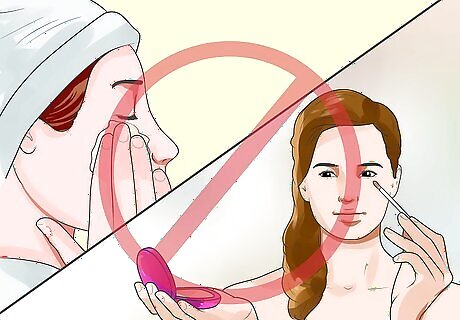
Avoid cosmetic products around the eyes. You should avoid putting any foreign substance on the skin around the eye until cleared by your doctor. This includes not only makeup, but also oils and lotions you may use regularly on your face. Eye irritations from these products can progress to infection that might endanger eye health. Of course, you can wear lipstick or lip gloss, but avoid any sort of makeup that could come into contact with your eye.

Protect your eyes from direct sunlight. After surgery, your eyes will not be able to adapt to light quickly. Bright light exposure may result in extreme light sensitivity and pain. Because of this vulnerability, protect your eyes from anything that might strain them. Wear sunglasses when you go out during the day for as long as instructed by your surgeon. This usually lasts from about 3 days to a week, though it will vary depending on the type of surgery. Follow your doctor's instructions.
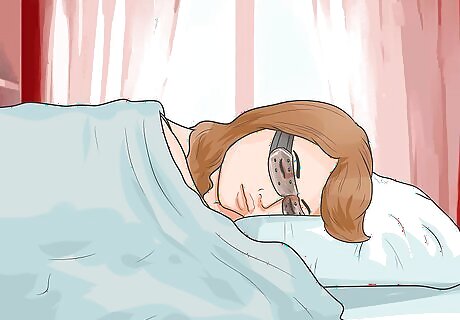
Wear a shield over your eye when you sleep. In some cases, your surgeon will advise you to wear a shield over your eye while sleeping for a few days to two weeks after surgery. This is to prevent you from squishing the eye or rubbing it while sleeping.
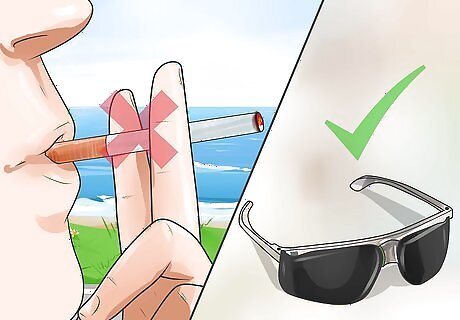
Avoid dust and smoke. For at least the first week after surgery, treat such irritants as potential causes of infection. Wear protective glasses if there's a risk dust particles getting in your eyes. Smokers should try to quit for at least the week, but wear protective glasses and avoid the smoke as much as possible if exposed to smoke.
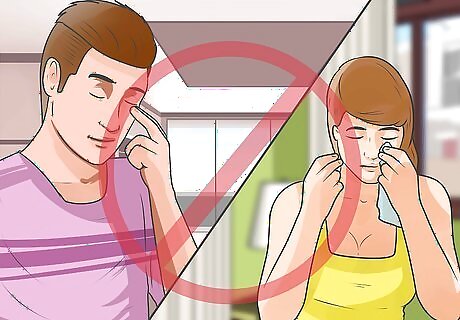
Do not rub your eyes. Your eye might itch after surgery, but resist the temptation to rub it. Rubbing your eye could disturb fragile incisions and the surface of the eye. You could also transfer bacteria from your hands. Your doctor will likely provide eye protection, like a patch of gauze or protective glasses. You can remove the protection to administer any prescribed eye drops. Make sure that you wear protection for as long as your surgeon advises. When you sleep, take care to not apply pressure to the eye and make sure to maintain any special positioning recommended by your doctor.
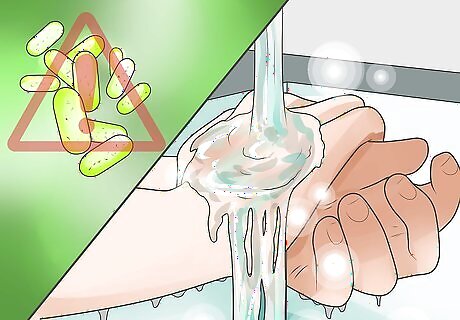
Be wary of bacteria. Wash your hands whenever there's risk of exposure to bacteria: outdoors, bathroom, traveling, etc. Don't surround yourself with too many people for the first few days after surgery; staying home may reduce your exposure to ill contacts.

Report severe symptoms to your doctor immediately. Reporting symptoms after surgery and attending scheduled follow-up appointments is the best way to contain potential problems. If common post-procedure symptoms occur but linger, you should still inform your doctor. If possible, record the time that the symptoms began. Inform your doctor immediately if you experience the following severe symptoms: Cataract surgery: Increased pain, vision loss or flashes/floaters. LASIK surgery: Increased pain or worsening vision in the days after the surgery. Retinal detachment surgery: You may still experience flashes of light, but they should gradually disappear. If you experience new flashes of light, increased floaters or visual field loss, contact your doctor immediately. All surgeries: excessive pain, bloody discharge, or vision loss.

Take care of yourself. To maintain your good health after surgery, eat balanced meals of lean proteins, fruits, vegetables, whole grains, dairy, and raw juices. Stay well hydrated to speed up the healing process. The Institute of Medicine recommends 13 cups (3 liters) of water per day for men, and 9 cups (2.2 liters) for women.

Take restorative vitamins. While not a replacement for a balanced diet, multivitamins can help round out your diet. In particular, vitamin C helps facilitate healing; vitamin E, lutein, and zeaxanthin protect new tissue from free radicals that can damage the body; and vitamin A is important for vision. The following are the FDA's recommended daily values for vitamins: Vitamin C: 90 mg for men; 75 mg for women; +35 mg for smokers Vitamin E: 15 mg of natural vitamin E or 30 mg of synthetic vitamin E Lutein and Zeaxanthin: 6 mg

Limit computer screen exposure. Depending on the surgery and your personal recovery, your doctor will give you specific instructions on screen time. For example, you shouldn't look at any screens for at least 24 hours after Lasik surgery. Speak to your doctor about screen limitations based on your surgery and recovery.
Using Medication Properly
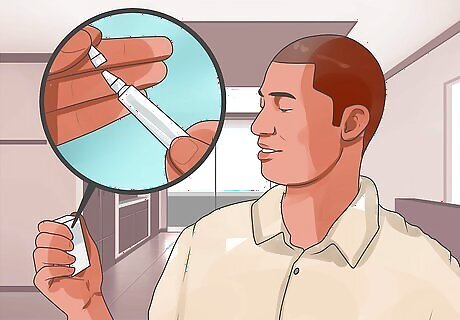
Use eye drops as directed. Your doctor will usually prescribe one of two kinds of eye drops: antibacterial or anti-inflammatory drops. Antibacterial drops protect from infection, while anti-inflammatory drops prevent swelling. If you have trouble treating your own eyes, ask a friend or family member to help. Your doctor may also prescribe drops that keep the eye dilated, like atropine, to help prevent scarring of the pupil and pain. He may also prescribe drops to help lower the eye pressure, especially if there is gas or oil injected into the eye during surgery.
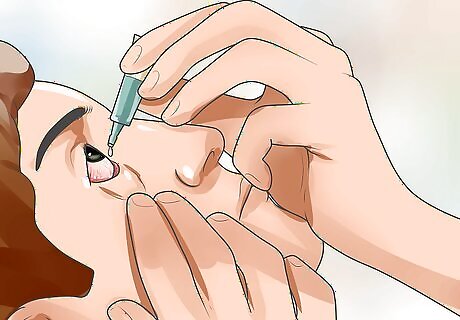
Administer the eye drops. Tilt your head backward and focus both eyes upward to avoid blinking. Pull your lower lid down with one finger to create a pocket under the eye, and administer the drop. Close your eyes, but don't rub them. Wait at least five minutes between administrations of each drop. Avoid touching your eye with eyedropper tip.
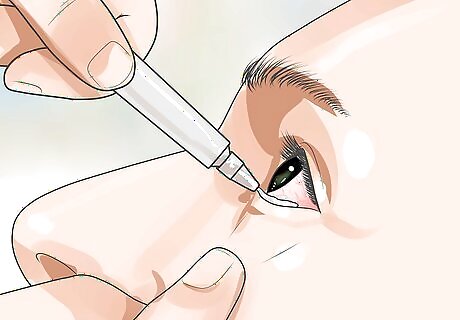
Learn how to apply eye ointment. Applying eye ointment is a lot like using eye drops. Tip your head back and gently pull down on your lower lid to form a pocket. Turn the bottle upside down over your eye and gently squeeze it to pour a thin stream of ointment into the pocket. Close the eye for about a minute to let the ointment spread over the eye and start working.
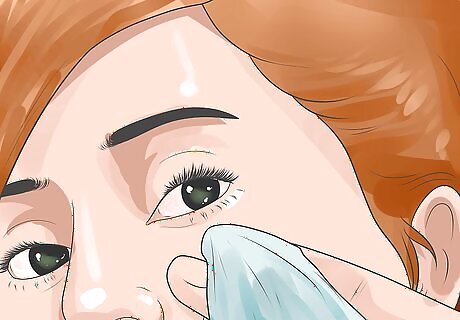
Clean your eye as directed by a doctor. Your doctor will likely tell you to clean around your eye twice a day. For example, you may boil water and place a clean washcloth into the water to sterilize it. Wash your hands to make sure they're clean, then run the washcloth gently over your upper and lower eyelids and lashes. Make sure that you also run the cloth over the corners of your eyes. Wash the cloth in boiling water or choose a fresh, clean cloth before each use. The cloth must be sterile, as eyes are vulnerable to infection after surgery.
Resuming Your Normal Life
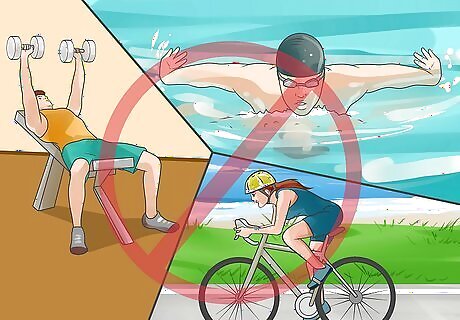
Take part in light activities. You can perform light movements the day you get home from surgery. However, avoid strenuous activity like weight lifting, jogging, cycling, or swimming for as long as your doctor advises. Lifting and straining increases pressure in the eye. This pressure can slow the healing process and could even damage the healing tissue. Ask others for help when doing anything too strenuous. Your friends and family will be more than happy to help you while you recover.
Wait before resuming sexual activity. Like with exercise, you need to work slowly back into sexual activity. Any sort of strenuous behavior can cause pressure to build up in your eye, slowing down the healing process. Ask your surgeon when you can resume such activities.

Do not drive immediately after surgery. Blurred vision after surgery may compromise your safety while driving. You should avoid driving until vision has recovered or your surgeon allows you to drive. In general, though, you can start driving when your eyes can focus and lose their light-sensitivity. Make sure you have someone who can pick you up after surgery.

Ask your doctor when you can resume working. Again, recovery time depends on surgery type and your personal recovery. Some types of surgeries call for up to six weeks of recovery time. Cataract surgery, on the other hand, can have a shorter recovery period of about a week.

Abstain from alcohol during recovery. While a glass of wine might sound like just what you need to feel better, alcohol increases the body’s tendency to retain liquid. If liquid builds up in your recovering eye, it could increase pressure as well. This, in turn, would slow down the healing process or further injure the eye.
Recovering from Different Eye Surgeries
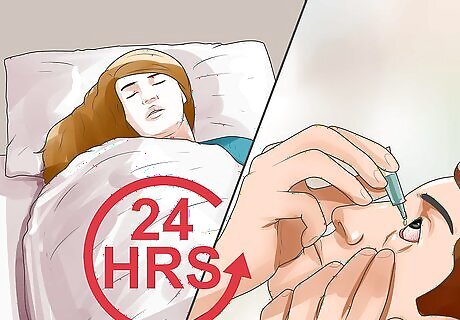
Rest for at least 24 hours after cataract surgery. Cataracts surgery removes a cataract, or a cloudy lens that normally develops with age. The surgeon inserts an artificial lens implant. After cataract surgery, patients often complain of a "foreign body" sensation in the eye. This is usually due to dry eye symptoms caused by the stitches or a cut nerve, or surface irritation/irregularity/dryness from the antiseptic used prior to surgery and drying of the eye's surface during surgery. The nerve takes usually a few months to heal, during which time your eye will feel strange. To combat these symptoms, your doctor may prescribe lubricating drops and antibiotics to prevent infection.
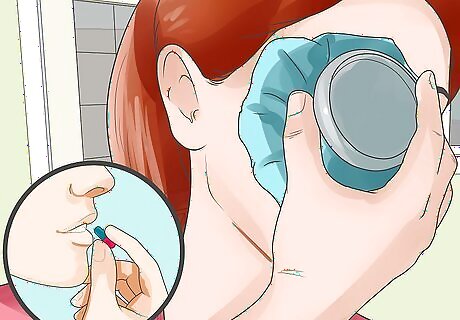
Be patient after retinal detachment surgery. The symptoms that prompted you to have surgery in the first place may persist for some time after surgery, but will gradually fade away. Surgery is required to prevent blindness. Symptoms include painless vision loss like a curtain going down; flashes of light in the corner of the eye; and the sudden appearance of many floaters. The recovery time for this surgery is about one to eight weeks. You may feel some pain, after surgery, but it can usually be treated with over-the-counter pain medication or an ice pack. You may also experience floaters or flashes of light that should gradually disappear. If you experience any new flashes of light that was not experienced before the surgery, contact your doctor immediately. You may also see a black or silver line going through your field of vision. This is due to trapped gas bubbles; as the gas absorbs in your eye with time, this should disappear.

Prepare for a long recovery from LASIK surgery. Although the procedure itself is quick, the recovery time can last anywhere from 2 to 3 months. LASIK is a corrective surgery for those who wear glasses or contacts. It is done with a laser that changes the curvature of the lens to allow for clear vision. After surgery, it's normal for your eyes to tear up more than usual, or for you to experience halos or blurry vision. You may also experience burning or itching, but it's important to refrain from touching the eye. Instead, inform your doctor of any problems if it becomes unbearable. Your doctor will likely plan a follow-up visit for 24- 48 hours after surgery to test your vision and check for infections. Alert your doctor of any pain or side effects that you may have at that time, and make a plan for further follow-up visits. You can gradually return to normal activities, but follow the plan set by your doctor. After 2 weeks, you can begin wearing makeup and lotions on the face again. After 4 weeks, you can take part in strenuous activities and contact sports. Avoid scrubbing your eyelids or going into hot tubs or whirlpools for 1-2 months, or as advised by eye care professional.




















Comments
0 comment